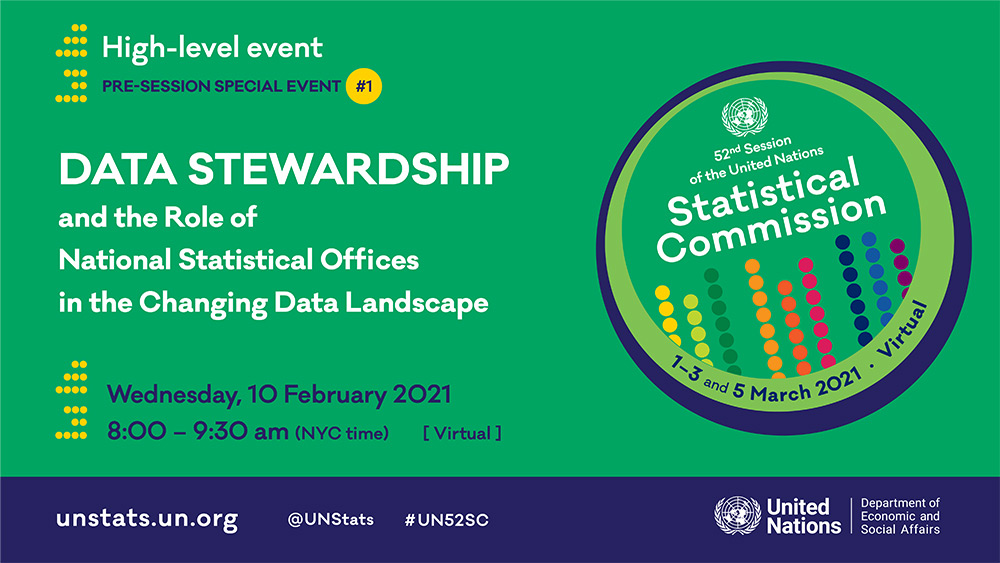United Nations Statistical Commission
Overview 52nd Session (2021) Side events

YouTube live: https://youtu.be/dtcsnOpyspM
With data demands ever increasing and a rapidly changing data ecosystem, national statistical authorities have responded by modernizing and integrating new data sources in the regular data production and strengthening their role as coordinator and custodians of data principles and data quality. Over the last year, the new challenges posed by the Covid-19 pandemic have accelerated this transformation and often forced national statistical offices to reshape their data programmes to adapt to the new circumstances. The more extensive use of private sector data during the pandemic has also intensified the need for improved data governance and for developing principles and tools for data privacy protection. NSOs (National Statistical Offices) have proved the value of official statistics as a trusted source of information. In the new data ecosystem, NSOs can broaden their mandate and play the role of data stewards at different levels and with different arrangements, to ensure the efficient utilization of all data sources while safeguarding data quality, confidentiality and security.
This year's event on data stewardship builds on the discussion held last year at the High-level Forum on Official Statistics during the 51st session of the UN Statistical Commission (UNSC) on whether the concept of data stewardship is an approach NSOs can use to realize opportunities presented in this rapidly changing data ecosystem and addresses some of the huge transformations the data landscape is presenting to NSOs; some of which are being accelerated by the impact of Covid-19.
In 2020, the High-level Group for Partnership, Coordination and Capacity-Building for statistics for the 2030 Agenda for Sustainable Development (HLG-PCCB) initiated a review of existing practices attributable to data stewardship in National Statistical Offices and other Government bodies. The HLG-PCCB, in undertaking the review, defined data stewardship with the broad goal to improve the use of data in society. The practices reviewed through the case studies were organized under four outcome 'pillars': better governance, better collaboration, better methods and capability and better access and understanding. The case studies received already show a range of approaches to data stewardship with different levels of involvement from the NSO. At the 52nd session, the UNSC will consider giving a mandate to a new working group to further develop the concept of data stewardship, continue the stock-taking exercise, compile best practices and provide recommendations and guidance on data stewardship and the role of statistical offices in the new data ecosystem.
This High-level event will be an opportunity to expand the discussion based on the more recent experiences of national statistical offices, as the COVID-19 response has in many cases accelerated innovation and collaboration and increased the use of new methods and data sources.
-
Guiding questions:
- How can the role of data steward help advance the relevance, openness and usability of data?
- What should be the role of the data steward in ensuring quality control and proper use of privately held data? What relationship should a data steward adopt to data producers outside of the public sector/ Government?
- How can the data stewardship role address issues of privacy and confidentiality over individuals' data in the wider data ecosystem, including both public and private data?
- And offer guidance in the use of statistics in algorithms and machine learning related to data-driven decision-making?
- How can the role of data steward help in meeting the growing demand for more and more disaggregated, data, which in turns requires the use of multiple sources and new data solutions?
- What are the most important functions of a data steward?
- Which of these functions can the NSO cover?
-
Invited Speakers:
Moderator- Ms. Jessica Espey, Senior Advisor to SDSN
-
Panel discussants
- Jeanne Holm, Deputy Mayor, City of Los Angeles
- Risenga Butler Maluleke, Statistician-General, Statistics South Africa
- Pam Dixon, Founder/ Executive Director, World Privacy Forum
- Pádraig Dalton, Director General, Central Statistics Office of Ireland
- Drudeisha Madhub, Data Protection Commissioner, Data Protection Office
- Julio Santaella, President, Instituto Nacional de Estadística y Geografía (INEGI)